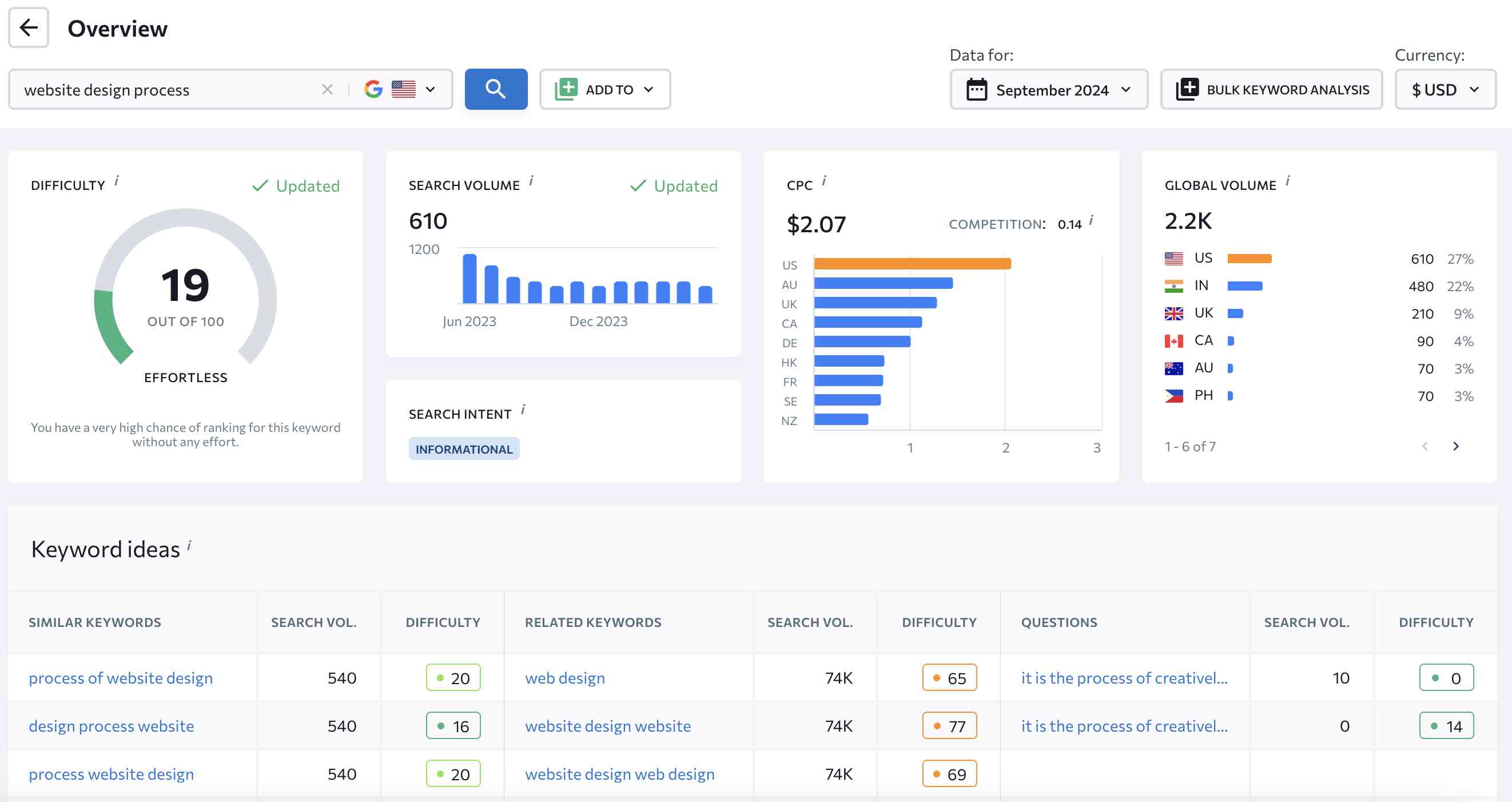
Effectively planning your PPC advertising budget is crucial for maximizing ROI or ROAS (return on ad spend). By following these three steps—researching key data points, implementing precise targeting, and consistently monitoring performance—you can ensure your campaign stays on track. For even more precision, you can use a PPC budget calculator to estimate your ideal budget based on your specific business needs.
Jump to our PPC Budget Calculator
3 Steps to Planning Your PPC Ad Budget
1. Research: Keyword & Cost-Per-Click Analysis
A successful PPC advertising campaign is in part driven by research, particularly when it comes to understanding the cost per click (CPC) and keyword selection. You need to use tools and internal data to make informed decisions.

Keyword Research:
Identifying effective keywords for your industry and location is the foundation of a strong PPC campaign. Tools like Google Keyword Planner will help you understand search volume trends and uncover new keyword ideas that may improve your campaign’s reach and lead generation potential.
Cost-Per-Click (CPC) Research:
Knowing how much you’ll pay per click is key to calculating your PPC budget. CPC can be influenced by competition, keyword demand, and top-of-page bid prices—which can help you estimate the range you’ll be bidding within.
In-House Data:
Use your business analytics to determine lead value, conversion rates, customer lifetime value, and other important metrics. Knowing these figures will allow you to calculate potential ROI. Once you know your average CPC and conversion rates, tools like our PPC calculator can precisely estimate the budget required to hit your goals. Despite the creative nature of marketing, digital advertising is, by nature, measurable and predictable.
2. Target Your Ideal Customers
Targeting the right audience is just as important as selecting the right keywords. By narrowing your audience with specific targeting options, you can ensure that your PPC ad budget is focused where it will be most effective. There are many ways to target a campaign and there are many types of campaigns. Following are some of the targeting methods you can utilize.
Geographic Targeting
Limiting your ad’s visibility to specific areas can significantly reduce unnecessary ad spend. Whether you are targeting by city, region, or even a radius around your business, geographic targeting ensures you’re only showing ads to potential customers in relevant locations.
Demographic Targeting:
Use demographic targeting to hone in on the most relevant segments of your audience, based on factors like age, gender, or household income. This ensures your ads are being seen by people most likely to convert and prevents wasteful ad spend.
Temporal Targeting:
Adjust your ads to run at optimal times—during specific days, seasons, or business hours. This is particularly helpful for businesses with seasonal demand or limited hours of operation.
Remarketing:
Retargeting those who have already engaged with your website, app, or previous ads is an effective, cost-efficient way to increase conversion rates without needing to bid on new keywords. By targeting visitors who have shown interest, you can significantly improve the ROI of your PPC campaign.
3. Monitor Your PPC Campaign
Monitoring your campaign’s performance is critical to ensuring continued success. Regularly tracking and analyzing metrics such as CPC, click-through rate (CTR), and conversions will help you identify areas where you need to adjust your bidding or targeting strategy.
Monitor Key Metrics
Your cost per click (CPC), CTR, and conversion rates should all be closely monitored to ensure your campaign delivers strong results. If a keyword is underperforming, adjust or replace it to prevent wasted budget. Likewise, ensure your ads are appearing in competitive positions without overspending.
Daily Budget Monitoring
Keep an eye on how quickly your daily budget is being spent. If you consistently hit your budget early in the day, it could mean your targeting is too broad, or your bids need adjustment.
After following these three steps—research, target, and monitor—you’ll have a solid understanding of your ideal PPC ad budget. To further refine your planning, try our PPC budget calculator below. This tool will help you calculate your PPC advertising budget based on average CPC, conversion rates, and your monthly lead capacity.
Use Our New and Improved PPC Budget Calculator 2.0
Now that you have a clear plan for researching, targeting, and monitoring your PPC campaign, it’s time to estimate your ideal budget. Use our PPC calculator below to determine how much you should spend on your next ad campaign, what your conversion rates need to be, and how much you can expect to profit from your PPC campaign.
This tool will help you calculate your ideal PPC advertising budget based on average CPC, conversion rates, and monthly lead capacity. To get the most accurate estimate, gather your average CPC, website conversion rate, and monthly lead capacity, then tune the inputs to create the conditions for success.
Industry PPC benchmark numbers used for the 2024 Xponent21 PPC Budget Calculator are from WordStream. Need a more helpful PPC calculator? Contact us and tell us what you want to see!
Xponent21 is a leading Search Engine Marketing firm specializing in PPC ads and SEO. The team leads on ranking brands in the top spots in AI overviews. To learn more about Xponent21 and our digital marketing services, get in touch with us today.

